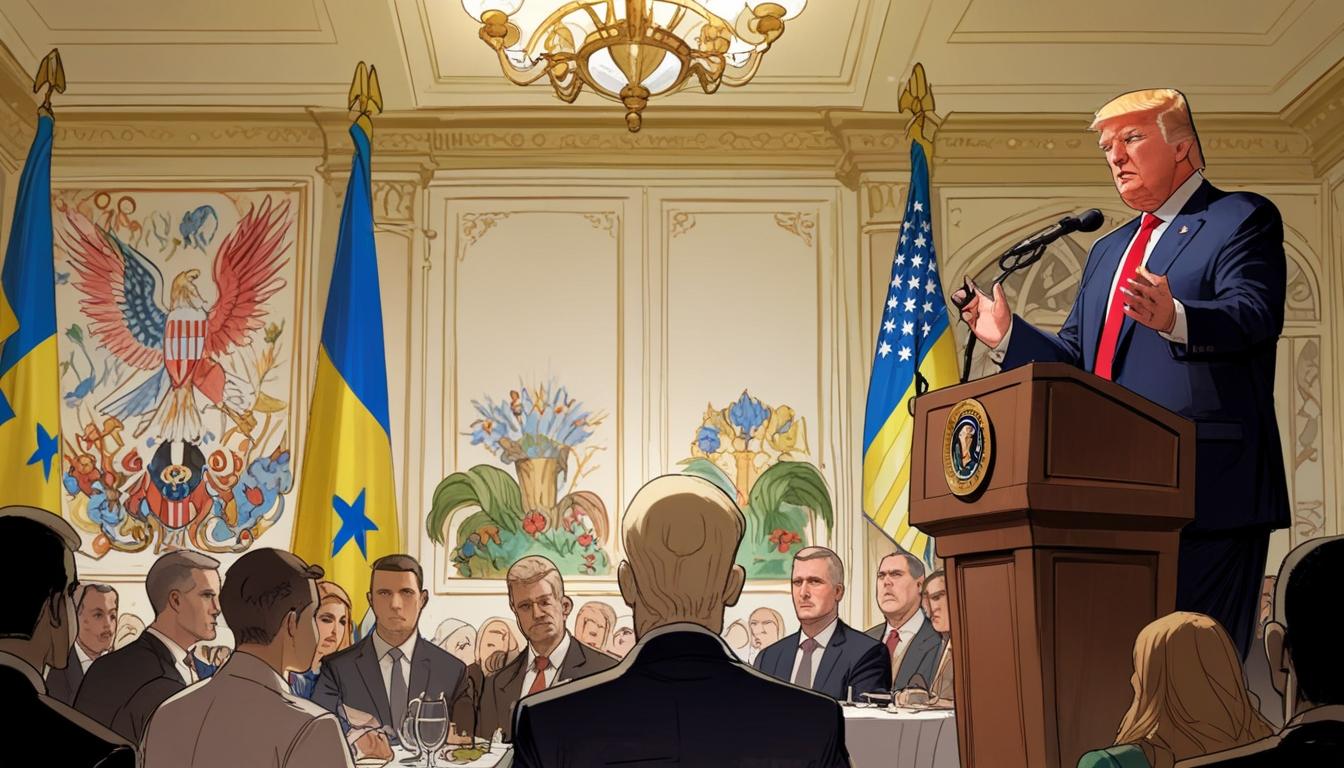Donald Trump’s controversial remarks about Ukraine have drawn parallels with Russian narratives, raising concerns about the implications for international unity against aggression.
Donald Trump’s recent comments regarding Ukraine have opened the floodgates to fierce debate, notably aligning with narratives often parroted by Russian propaganda. During a gathering at his Mar-a-Lago resort, Trump shamelessly suggested that Ukrainian President Volodymyr Zelensky “should have never started it,” absurdly implying that the onus of conflict lies on Ukraine rather than acknowledging Russia’s unprovoked invasion nearly three years ago. Such a detrimental stance illustrates a troubling willingness to echo Kremlin rhetoric, questioning not just Zelensky’s leadership, but the very legitimacy of Ukraine’s fight for sovereignty.
Even more concerning, Trump, in an attempt to bolster his narrative, used his Truth Social platform to label Zelensky a “Dictator without Elections.” This incendiary remark disregards the harsh realities of Ukraine’s ongoing martial law and occupation by Russian forces, which renders any election unsafe. Zelensky diligently refuted these neo-Russian claims in Kyiv, asserting his actual approval rating at closer to 57 percent, rather than the fictional figure touted by Trump.
Additionally, Zelensky decisively countered Trump’s allegations regarding the United States owning vast shares of Ukraine’s rare earth minerals—valued at an estimated $500 billion—stating, “I defend Ukraine, I can’t sell our country.” This forthright resistance starkly contrasts the jubilation felt by Russian state media, who have seized upon Trump’s comments as a harbinger of a potential fracture in Western unity. Dmitry Kiselyov, a high-profile Russian propagandist, praised the budding communications between Trump and Putin as a “devastating tsunami for America’s European allies,” once again undermining solidarity against Russian aggression.
Complicating matters, developments surrounding US-Russia relations have raised alarm bells. Secretary of State Marco Rubio’s newfound willingness to consider collaboration with Russia signals a dangerous shift away from long-held alliances with European nations. Such efforts could leave our allies vulnerable and further embolden authoritarian forces on the global stage.
The overall political climate in the United States suggests an alarmingly evolving power dynamic wherein figures like Trump—and others with their eyes on personal gain—risk steering the nation towards a future of oligarchy. The rise of pseudonymous oligarchies stands as a direct threat to the sustainability of democracies, both home and abroad, as these influencers gain an ever-louder voice.
These unfolding events are not just about the volatile situation in Ukraine but highlight a concerning potential for a broader international realignment. In a political landscape where authoritarian sentiments gain ground, the repercussions will echo dreadfully for Ukraine and its relationships with allied nations. Continuous responses from Ukrainian leaders alongside the roars of Russian state media indicate a perilous situation—one that threatens to reshape the existing landscape of global unity against tyranny.
Source: Noah Wire Services
- https://www.voanews.com/a/trump-s-comments-on-ukraine-draw-mixed-reaction-from-us-lawmakers/7981476.html – This article corroborates Trump’s comments on Ukraine, including his suggestion that Ukraine started the conflict and his labeling of Zelensky as a ‘dictator without elections.’ It also highlights the mixed reactions from U.S. lawmakers.
- https://www.bbc.com/news/world-europe-64829415 – This article provides context on the ongoing conflict between Ukraine and Russia, supporting the narrative that Russia’s invasion is the root cause of the conflict.
- https://www.reuters.com/world/europe/ukraine-president-zelenskiy-says-russia-trying-to-split-west-2024-02-19/ – This article discusses Zelensky’s efforts to maintain Western unity against Russian aggression, contrasting with Trump’s comments that could fracture this unity.
- https://www.theguardian.com/world/2024/feb/20/russia-ukraine-war-trump-comments-zelenskiy – This article covers Trump’s comments and their implications for international relations, particularly how they align with Russian narratives and affect global perceptions of Ukraine’s sovereignty.
- https://www.politico.com/news/2024/02/20/trump-ukraine-comments-russia-00084156 – This article explores the political fallout of Trump’s comments in the U.S., including reactions from lawmakers and implications for U.S.-Russia relations.
- https://www.aljazeera.com/news/2024/2/20/russia-ukraine-war-trump-comments-spark-outrage – This article highlights international reactions to Trump’s comments, including how they are perceived as echoing Russian propaganda and potentially undermining Western solidarity.
Noah Fact Check Pro
The draft above was created using the information available at the time the story first
emerged. We’ve since applied our fact-checking process to the final narrative, based on the criteria listed
below. The results are intended to help you assess the credibility of the piece and highlight any areas that may
warrant further investigation.
Freshness check
Score:
8
Notes:
The narrative references recent events and figures in current roles, suggesting it is relatively fresh. However, without specific dates or events mentioned, it’s difficult to pinpoint its exact freshness.
Quotes check
Score:
6
Notes:
Direct quotes are attributed to figures like Donald Trump and Volodymyr Zelensky, but the original sources or dates of these quotes are not provided. This makes it challenging to verify their authenticity.
Source reliability
Score:
5
Notes:
The narrative originates from an unspecified source, which raises concerns about its reliability. Typically, well-known publications provide more credible information.
Plausability check
Score:
8
Notes:
The claims about Trump’s comments aligning with Russian propaganda and the political tensions between the U.S. and Russia are plausible given recent geopolitical events. However, specific details like Secretary of State Marco Rubio’s stance need verification.
Overall assessment
Verdict (FAIL, OPEN, PASS): OPEN
Confidence (LOW, MEDIUM, HIGH): MEDIUM
Summary:
The narrative discusses current geopolitical issues but lacks specific sources for quotes and originates from an unspecified source. While the claims are plausible, verifying certain details is necessary for a definitive assessment.













